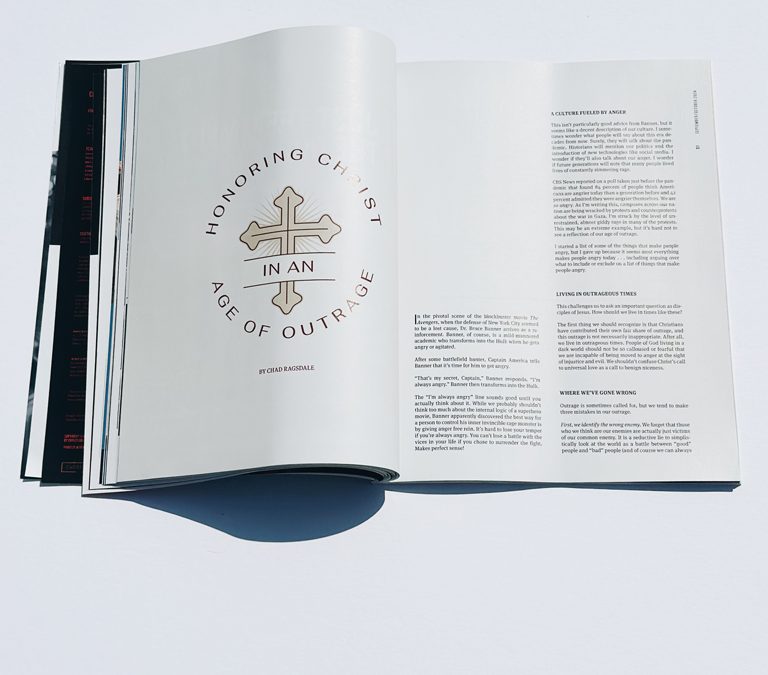How the Church Must Respond to Sexual Identity Issues in Both Truth and Grace
By Caleb Kaltenbach
Not long ago, I sat in an apartment crying with two African-American lesbians. They were married and were attending a church in Houston that I was working with. After being with the church awhile, they concluded God designed sexual intimacy for marriage between a man and woman. They asked the church staff about next steps, but the ministers were as confused as the ladies. Now I was in their living room processing their situation.
They had been together for 10 years and married for three. The ladies believed they should divorce, but there were extenuating issues. First, they loved each other. One of the ladies was disabled and sexual intimacy was impossible, but they had a strong emotional bond. Second, if they divorced, one of the ladies would lose her health care. For her, this was terrifying as she’d be without medicine for her schizophrenia.
“I almost got shot the last time I didn’t have my medicine,” she told me.
“What happened?” I asked.
“Well, I thought I heard my family calling me from outside. So, I went outside and kept yelling to them. I went down to the sidewalk to yell. The police showed up and I couldn’t tell the difference between their voices and the other voices I was hearing. They probably thought I was crazy. I saw one officer pull out his gun and I dropped to the ground.”
You could hear a pin drop as she told her story.
“I know they were just doing their job,” she said. “But it’s not easy being a black schizophrenic lesbian at nighttime when cops think you’re crazy.”
We finished our time together by discussing possible options for their situation. I told them they should go back to their church leadership and ask to walk with them during this season.
Let me ask you, would your church be willing to walk with those ladies? Does your congregation stand firm on the words of Scripture with an openhanded posture of grace and love? If your church wants to be like Jesus, you need to stand in the tension of grace and truth. Jesus came in grace and truth (John 1:14, 17). Paul tells us, speaking the truth in love brings maturity (Ephesians 4:15). John pleads with us to love in action and truth (1 John 3:18). Instead of taking sides, how can churches live in the tension of grace and truth? Here are five ways your church can begin living in the tension.
Strive for Unity Within the Tension
Everyone gravitates naturally either toward grace (mercy) or truth (rule-keeping). People usually stay “on their side” of the divide because tension is uncomfortable. When Christians take sides, they move away from each other. Christians who quit taking sides, and instead live in tension, cultivate unity. Those on the truth side stretch to grace, and those on the grace side stretch to truth—they move toward, not away, from each other. This creates tension, but tension brings the gift of each other in a unified middle. Churches should maintain the belief that sexual intimacy was designed for a man and woman in marriage, while teaching that grace is for everyone . . . and that includes anyone. The tension also makes churches different and allows them to love people with whom they disagree.
Value God’s Words Over Society’s Latest Trends
In Moral Choices (Zondervan, 2018), ethics professor Dr. Scott Rae highlights the conflict between society’s latest moral norms and our desires, beliefs, and values. Society is shifting from values based on Christian-Judeo principles to moral ambiguity.
“[Society sees] no such thing as objective reality, truth, value, reason, and so forth,” philosopher J.P. Moreland wrote several years ago in the Journal of the Evangelical Theological Society. “All these are social constructions, creations of linguistic practices, and as such are relative not to individuals, but to social groups that share a narrative.”
Increasingly, society sees little difference between acceptance and agreement. Many people consider disagreement with their choices as rejection of their personhood. Churches are pressured to choose tolerance over tension, but churches that do so have seen significant drops in attendance and cultural influence. Ironically, more people who relate as LGTBQ attend nonaffirming churches (that is, they live in the tension . . . like the two ladies in Houston) than affirming churches. The women didn’t feel shamed; they were OK with their church disagreeing with them, because they felt loved. Thus, the church gained influence to speak into their lives.
Help People Carry a Difficult Burden
Most of the time, individuals who are attracted to the same sex do not experience a shift in attraction. Some might find themselves attracted to the opposite sex or a particular individual of the opposite sex, but these examples are few and far between. Many share the experience of Dr. Wesley Hill, a New Testament professor who lives with this burden because he has chosen to remain celibate because of his biblical convictions.
“Although I did not and still do not want to dispute that some same-sex-attracted persons experience what have been described as ‘significant shifts on a continuum of change’ and end up marrying a spouse of the opposite sex, I did want to testify that such shifting had not been (and still has not been) my own experience,” Hill wrote in the Journal of the Evangelical Theological Society in 2016. “I have remained exclusively attracted to members of my own sex.”
Christians attracted to people of the same sex, and who have chosen celibacy, are carrying a more difficult burden than single heterosexual Christians. Single heterosexual believers may eventually fall in love and get married, but the same isn’t true for same-sex attracted Christians (unless they fall in love with someone of the opposite sex). Unfortunately, they carry the difficult burden of being alone and single. While this is a sacrifice for Jesus, it is still a difficult burden. As such, churches are responsible to care for such attendees and members who are celibate (especially if church leaders have recommended celibacy). I’d contend church leaders should become family in a special way to such folks. To figure out how to do so, church leaders should ask questions such as these:
Who will become family for this person? What does this person enjoy?
Who is currently in this person’s life?
Where can we best serve him?
How can we ensure she will not feel isolated?
Be Intentional
Churches will never live in the tension if they primarily guard the gate (e.g., sacred cows in your church). Guarding gates, while important, can forge a gap where a bridge could be built. Tension builds bridges by establishing boundaries of grace and truth. On the bridge, Christians and non-Christians are able to do life—even church—together.
Contrary to popular opinions, the church does not exist for Christians or for unbelievers. The church consists of Christians who encourage and equip one another to pursue unbelievers with the gospel forthe glory of God alone. Can you feel the tension? Far from being new, this tension was experienced by first-century churches.
Paul advised the Corinthian church: “So if the whole church comes together and everyone speaks in tongues, and inquirers or unbelievers come in, will they not say that you are out of your mind?” (1 Corinthians 14:23). We get so lost in arguments on tongues that we miss Paul’s real scenario—unbelievers in a church service with believers—and Paul told believers to be intentional about what they do and don’t do during worship services.
Paul loved intentionality. He preached one way to Athenian philosophers and another way to Festus, the Jewish people in Jerusalem, etc. He urged Christians to have the same intentionality in their personal lives: “Be wise in the way you act toward outsiders; make the most of every opportunity. Let your conversation be always full of grace, seasoned with salt, so that you may know how to answer everyone” (Colossians 4:5, 6).
Yet Paul never compromised or erased grace. Rather, he asked churches to live in the tension of grace and truth. If he asked first-century Christians who lived in a brutal, sex-crazed society to be intentional, how much more should we be intentional? The Houston church’s intentionality created margin for a lesbian couple to attend, feel loved, and trust the leaders enough to ask for their help in a difficult season. Again, living in tension afforded the church influence.
Prioritize Conversations
Policies are important; they provide organizational guardrails. However, churches living in the tension of grace and truth need more conversations than policies. In 1 Corinthians 9:19-23, Paul shared how he was intentional with different people so he could relate with them and eventually share Jesus with them. He was always ready to correct error, but he was more concerned with making a difference.
People who were unlike Paul liked sharing time with him (as those unlike Jesus liked Jesus). However, when he gained influence, Paul was willing to share uncomfortable truth for the person’s long-term gain. He believed doing otherwise was unloving.
“People who love authentic community always prefer the pain of temporary chaos to the peace of permanent superficiality,” John Ortberg wrote in Everybody’s Normal Till You Get to Know Them (Zondervan, 2003). “Telling people what they want to hear is not love.”
Church leaders can gain influence as Paul did. Paul spent time with people. He listened and dialogued. We can do the same. Paul and Jesus also asked really good questions.
Howard Hendricks, the late Dallas Theological Seminary professor, was a brilliant teacher. He was well-known for saying, “If you want to understand a biblical text, you’ve got to bombard it with questions” (from Living by the Book [Moody, 2007]). Similarly, if church leaders want to understand people, they need to learn how to ask good and helpful questions. Good questions are less threatening. Questions allow people to talk about themselves (which most people love). When they do, they will reveal their story and you’ll be able to be empathetic toward them and gain influence.
Leading a church in the tension of grace and truth isn’t easy. You’ll be accused of either being too tough or compromising truth. You may even doubt yourself. Living in tension takes courage, but people are worth it . . . people like the two ladies in Houston. Their relationship with Jesus is worth all the uncomfortable tension in the world.
Caleb Kaltenbach is the author of Messy Grace: How a Pastor with Gay Parents Learned to Love Others Without Sacrificing Conviction and God of Tomorrow: How to Overcome the Fears of Today and Renew Your Hope for the Future. He founded The Messy Grace Group where he helps churches understand, love, and engage LGBTQ individuals without sacrificing biblical beliefs. You can reach him at messygracegroup.org. Also, Caleb knew Dudley Rutherford back when Dudley had hair.





We received this comment via email.
_ _ _
I appreciated the article by Caleb Kaltenbach in the Christian Standard [“Living in the Tension,” June 2019, p. 34]. I think he dealt with the most difficult subject facing the church and society today, and did it in a kind, yet firm way. There is no doubt in my mind that if the church is to be the church, we must face that tension constantly. New Christians and seekers bring baggage with them, and church leaders need to have a pretty well fixed idea of how to deal with some very knotty issues with no easy or “pat” answers. My compliments to you for bringing up the subject.
George Stehle